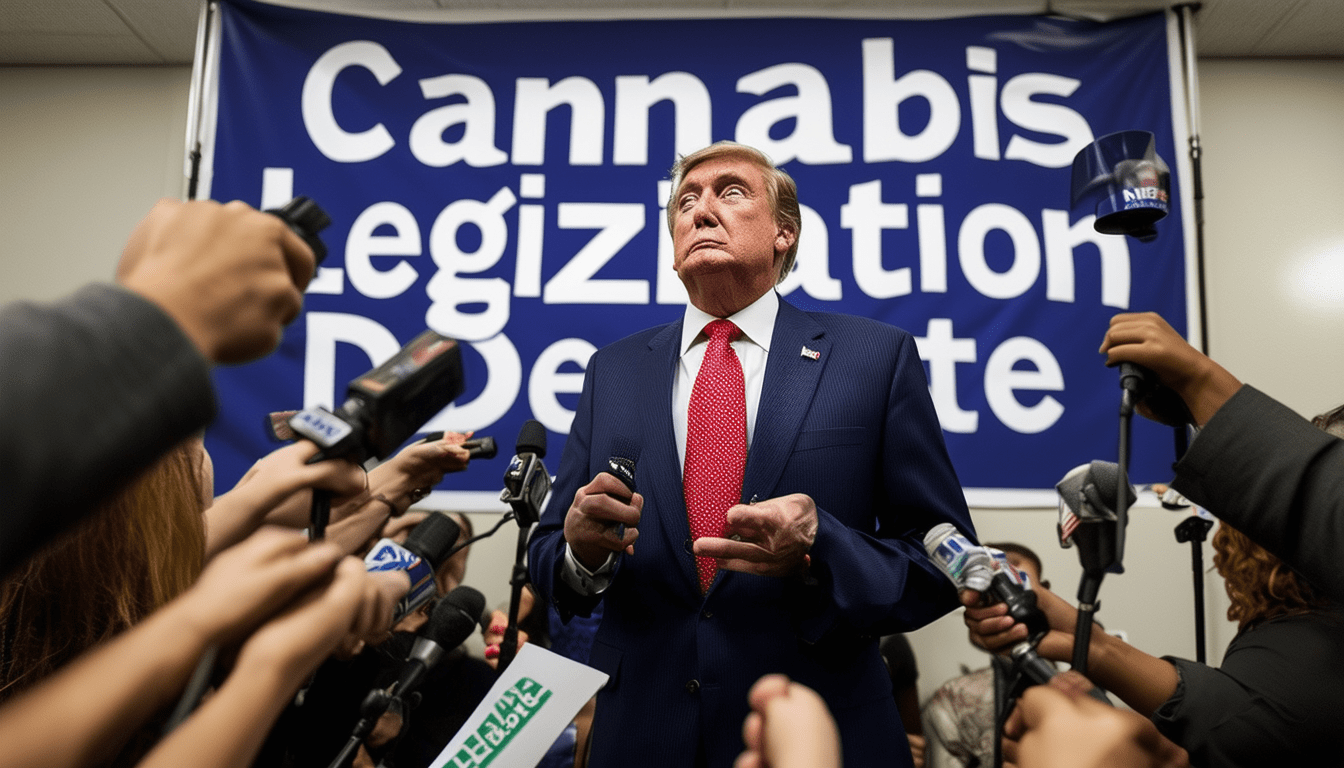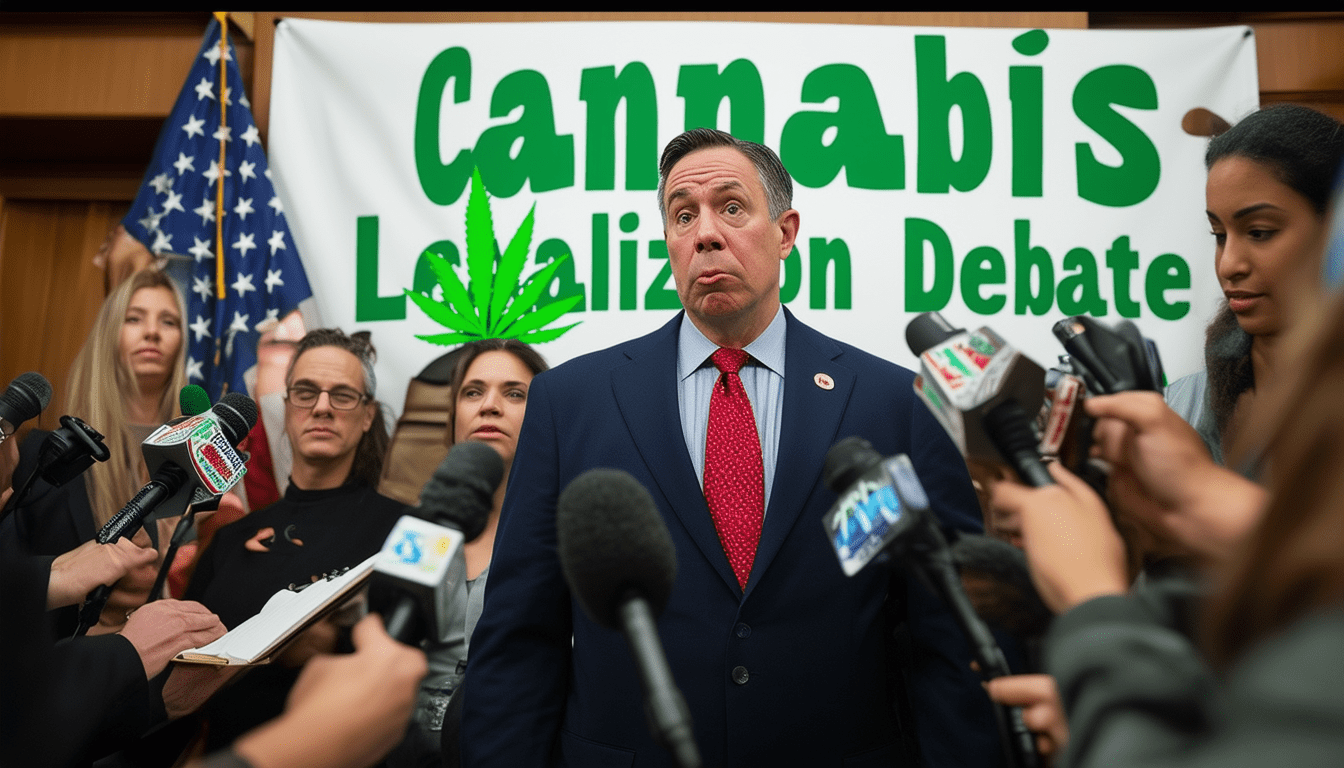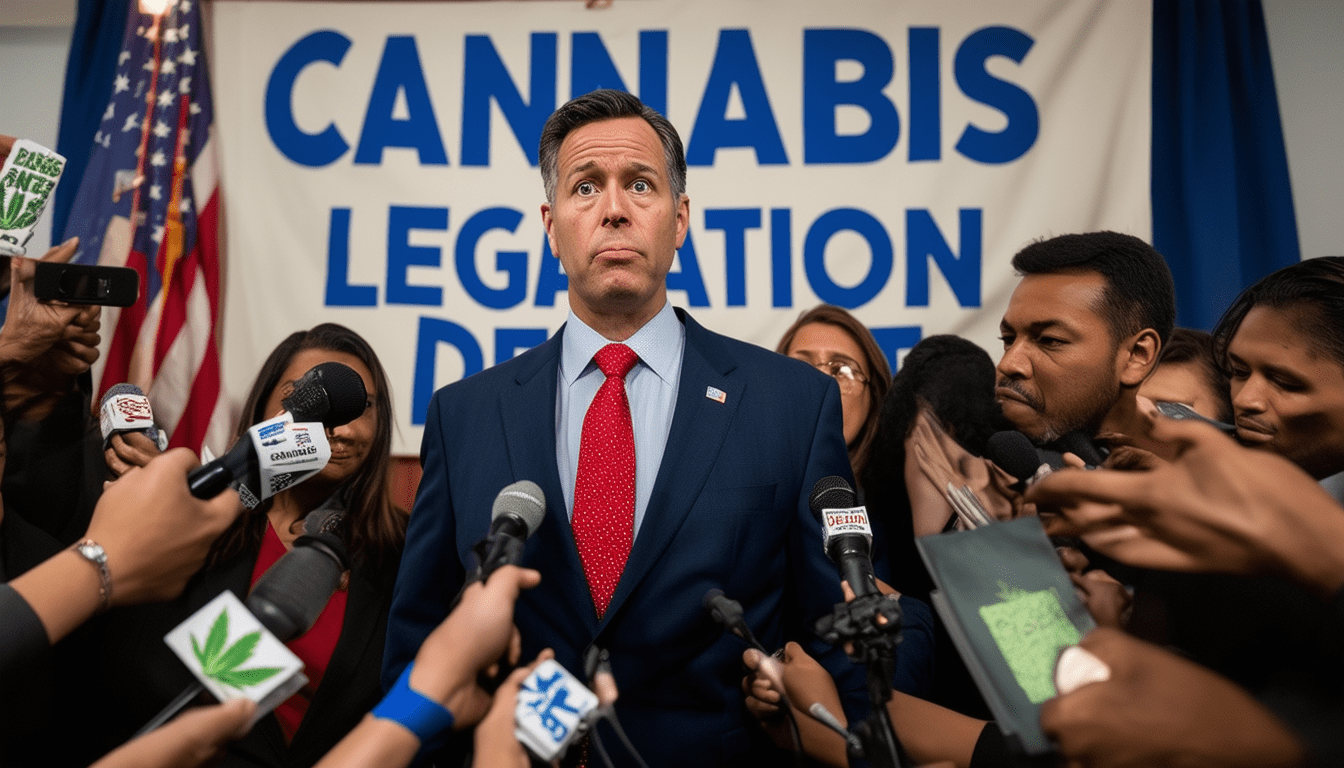GOP Congressman Caught in Cannabis Controversy Despite Stance Against Legalization
|
IN BRIEF
|
The ongoing debate surrounding cannabis legalization has taken an intriguing turn with the involvement of a GOP Congressman who has recently found himself at the center of controversy due to an arrest related to marijuana. This incident raises critical questions about the consistency of political positions, particularly within the Republican Party, where traditional stances against legalization often clash with the realities of personal experiences. As public sentiment slowly shifts in favor of cannabis reform, the Congressman’s situation serves as a striking example of the contradictions that can arise in the realm of politics, challenging the validity of anti-legalization rhetoric amidst a changing societal landscape.

The recent developments surrounding a GOP congressman who has openly opposed cannabis legalization have sent ripples through the political landscape. This congressman, despite his firm stance against the legalization of marijuana, has found himself at the center of controversy after being arrested for cannabis-related activities. This paradox raises critical questions about the inherent contradictions within political rhetoric, especially regarding a divisive issue like cannabis policy.
Political Backdrop
The landscape of cannabis legislation has evolved dramatically in recent years, with a growing number of states opting for legalization—both for medical and recreational use. While grassroots movements advocate for these changes, several conservative lawmakers remain staunchly opposed to any form of cannabis legalization, citing health risks and moral considerations. This political backdrop makes the congressman’s actions even more glaring, as they contradict his earlier commitments to oppose cannabis reform.
Details of the Incident
Reports have surfaced regarding the congressman’s arrest which has sparked a significant backlash. Despite his public denunciation of cannabis, he was found in possession of marijuana during a routine police encounter. Such incidents land heavily in the court of public opinion, further complicating the narrative surrounding his political motivations and integrity. Many constituents are questioning how someone who opposes cannabis could personally indulge in it, undermining his credibility.
The Irony of Support
Interestingly, recent polls reflect a notable shift in public opinion. Many voters, including those who identify with the GOP and support for Vice President Kamala Harris, advocate for the rescheduling of cannabis. It highlights a growing consensus that challenges the long-held positions of traditional conservatives. The congressman’s arrest brings this irony to the forefront, illustrating a dissonance between personal behavior and public policy ideology.
Implications for Future Policies
As the debate over cannabis continues, this incident could have significant repercussions regarding future legislative measures. Supporters of marijuana legalization will likely use this situation to enhance their arguments for reform, spotlighting the hypocrisy of politicians who oppose legalization while engaging in it themselves. This creates an environment where the political landscape may be further influenced by changing public sentiment and increased advocacy for cannabis-related reforms.
Legal and Ethical Considerations
The congressman’s case also raises questions about the legal and ethical responsibility of lawmakers. Lawmakers are expected to set an example for their constituents by adhering to the laws they endorse. When personal actions contradict public positions, it opens up broader discussions about integrity and accountability in governance. This case, as it unfolds, will likely attract scrutiny not only for its legal aspects but also concerning ethical governance standards.
The unfolding situation of this GOP congressman serves as a potent reminder of the contradictions prevalent in political discourse regarding cannabis. With evolving public opinion and precedents being challenged, the implications of such incidents will resonate beyond just one individual, impacting the broader dialogue surrounding cannabis legalization in America.
Comparative Analysis of GOP Congressman on Cannabis Stance
| Criteria | Details |
| Position on Legalization | Opposes legalization despite previous cannabis-related issues |
| Personal History | Arrested for marijuana possession, raising questions on stance |
| Public Perception | Criticized for hypocrisy amid growing pro-cannabis sentiment |
| Political Influence | Attempts to sway voter opinions against marijuana legalization |
| Bipartisan Polling | Majority of constituents support rescheduling cannabis |
| Future Prospects | May face backlash in upcoming elections for inconsistent messaging |

In a bewildering twist of events, a GOP congressman finds himself at the center of controversy regarding cannabis. Despite his firm stance against cannabis legalization, it has come to light that he has previously been arrested for marijuana possession. This juxtaposition raises pressing questions about the consistency of political beliefs and the broader implications of cannabis policies in America.
Background of the Congressman
The congressman in question, who represents Florida, has a history of vocal opposition to cannabis legalization efforts. His public statements have emphasized the potential dangers associated with marijuana use, positioning himself as a staunch advocate for strict drug policies. However, his recent arrest challenges his credibility and calls into question his authenticity as a leader on this issue.
Political Ramifications
The implications of this controversy extend well beyond personal accountability. It illustrates a growing divide within the Republican Party, particularly as public opinion shifts in favor of cannabis reform. According to polling data, a significant portion of voters, including those who back prominent GOP figures like former President Donald Trump, support rescheduling marijuana to a legal status. This disparity could lead to a reevaluation of the party’s stance on cannabis and influence legislative decisions significantly.
Cannabis Legalization Trends
As more states move toward legalization, the pressure mounts on federal lawmakers to alter outdated cannabis policies. Recent developments indicate that many Americans are advocating for a more progressive approach to drug policy, including medical cannabis and recreational use. The congressman’s contradictory actions may not only affect his political future but also foster a larger conversation about the impact of cannabis laws on society at large.
Public Reaction
The public’s response to this controversy has been robust, with many constituents expressing disbelief over the congressman’s dual position on cannabis. Social media platforms have exploded with discussions, with some advocating for a reevaluation of cannabis laws, while others demand accountability from their elected officials. Such public scrutiny suggests that constituents are increasingly unwilling to tolerate hypocrisy within their political representatives.
The Path Forward
Moving forward, this incident may serve as a catalyst for a broader dialogue on cannabis legalization in the United States. As more individuals, including those within the GOP, acknowledge the benefits of cannabis, it could lead to transformative changes in legislative frameworks. The ongoing discourse surrounding cannabis not only reflects changing societal attitudes but also presents an opportunity for lawmakers to align their policies with the evolving expectations of their constituents.
- Event: Arrest of GOP Congressman for cannabis possession.
- Contradiction: Supports anti-legalization while facing cannabis-related charges.
- Public Response: Mixed reactions from constituents; some express outrage.
- Political Impact: Opens debates on credibility of anti-cannabis stance.
- Campaign Contributions: Relies on donations from anti-cannabis lobbyists.
In recent political discourse, a GOP Congressman found himself at the center of a significant cannabis controversy after facing arrest related to marijuana possession while simultaneously opposing cannabis legalization. This incident epitomizes the contradictions present within political stances on cannabis, particularly among those in the Republican Party. With evolving public sentiment favoring legalization, it is crucial to examine the implications of such conflicts and recommend clearer positions on cannabis legislation.
Addressing Hypocrisy in Political Stances
The arrest of a Congressman for marijuana possession while advocating against its legalization raises serious questions about the authenticity of his political stance. Hypocrisy in political beliefs can diminish public trust and lead to disillusionment among constituents. Politicians must ensure that their actions align with their rhetoric to maintain credibility. Therefore, it is vital for lawmakers to reflect on their personal experiences with cannabis and how those experiences influence their policy decisions.
Encouraging Transparency
To combat the perception of hypocrisy, it is essential that political figures practice transparency. They should openly discuss their past experiences, including issues of substance use, which would allow the public to comprehend their values and convictions fully. Informative dialogues about personal experiences with cannabis can foster a better understanding of the complexities surrounding drug legislation. This approach can help humanize lawmakers, allowing them to connect with constituents who may have similar experiences.
A Call for Bipartisan Cooperation
To advance cannabis legislation effectively, bipartisan cooperation is necessary. The disconnect between various political factions regarding cannabis reform not only hampers progress but also alienates public opinion, which increasingly favors legalization. By recognizing common ground, lawmakers from both parties can construct more effective and informed cannabis policies.
Understanding Voter Sentiment
Polling indicates an increase in support for cannabis rescheduling and legalization, including among traditionally conservative voters. As attitudes evolve, GOP leaders must recognize these shifts and consider them in their policy frameworks. Engaging in open discussions with supporters, opponents, and advocacy groups can assist Congress members in crafting legislation that reflects public sentiment. Emphasizing the importance of public health, economic growth, and social equity can strengthen the case for reform, appealing to a wider audience.
Prioritizing Evidence-Based Policy Making
To ensure that cannabis policies are relevant and effective, it is vital to ground decisions in credible evidence and research. This involves analyzing studies that examine the effects of marijuana on health, society, and the economy. Legislators must advocate for reforms based on data rather than anecdotal evidence or personal bias.
Supporting Responsible Regulation
In addition to fostering informed decisions, lawmakers should prioritize responsible regulation of cannabis within their legislation. This includes implementing measures that protect public health, ensure product safety, and minimize misunderstandings surrounding cannabis use. Establishing frameworks that address concerns about potential risks, such as teenage usage or impaired driving, demonstrates a commitment to both legalization and public safety.
Ultimately, the cannabis controversy surrounding the GOP Congressman highlights the complexities of political stances on this contentious issue. By embracing transparency, fostering bipartisan cooperation, prioritizing evidence-based policymaking, and championing responsible regulation, lawmakers can work to ensure that their positions on cannabis align with the evolving sentiments of their constituents.
FAQ: GOP Congressman Caught in Cannabis Controversy Despite Stance Against Legalization
Q: What is the main issue surrounding the GOP congressman? The congressman has been involved in a controversy after being arrested for cannabis possession, despite his public stance against cannabis legalization.
Q: How does the congressman’s actions contradict his political position? His arrest for cannabis possession contradicts his political rhetoric, which has been against the legalization of marijuana, creating a significant disconnect for his supporters and constituents.
Q: What does this controversy reveal about the political landscape regarding cannabis? This controversy highlights the continuing tensions between personal behavior and public policy as attitudes toward cannabis legalization evolve, even among conservative lawmakers.
Q: How have voters reacted to the congressman’s arrest? The arrest has sparked negative reactions from voters who feel that personal accountability is important, especially for elected officials who advocate against cannabis legalization.
Q: Is there a wider impact on GOP support for cannabis reform? Yes, this situation could affect broader GOP support for cannabis reform, as constituents may demand more consistency from their representatives on drug policy issues.
Q: What could be the political consequences for the congressman? The congressman may face political repercussions, including potential challenges to his re-election campaign and criticism from both party members and the public for not aligning his actions with his stated beliefs.





Post Comment